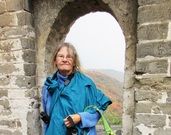Some of my favorite authors wrote new books in 2018. Barbara Kingsolver wrote Unsheltered, a novel about U.S. intellectuals whose lives are not what they expected. It's set in a town in New Jersey and moves between the nineteenth and twenty-first centuries. In the nineteenth century, the town is closely controlled by its founding family. A man who wants to teach real science in a public school finds himself blocked by that century's version of the Christian Right. But a brilliant woman makes scientific discoveries in her own home. That part is based on real people. The twenty-first century focus on a fictional family living in the same house. The parents are intellectuals who lost their professional niches when the husband's college folded. The wife, much against her wishes, has become an in-home caregiver for her right=wing father-law. The book looks at the problem with focusing on middle-class dreams in today's resource-depleted world.
Rosellen Brown, a favorite author who hasn't published a new book in 18 years, came out with The Lake on Fire, a novel about the travails of a nineteenth century family of poor Jewish immigrants who were given land in Wisconsin even though they had never farmed before. The daughter, who has been allowed only a short time in school, is determined to find the wider world. She runs away, and her younger brother follows her. They wind up in Chicago, which gives the author an opportunity to show the lives of the poor who work in sweatshops, contrasted with the lives of the Gilded Age rich.
Yet another favorite author, Elif Shafak, brought out Three Daughters of Eve, the story of a Turkish woman who grew up with an extremely pious Muslim mother and an almost atheist father. She lives her father's dream of going to Oxford, where she meets a professor who teaches about God as an idea without reference to religion. She is enchanted. The story moves between her college years and her later life as the wife of a businessman.
Syria
Some excellent books about Syria tore at my heart. English reporter Deborah Campbell wrote A Disappearance in Damascus, a memoir about the terrifying disappearance of a friend who was taken to one President Bashir Assad's prisons. A Syrian woman in exile, Samar Yazbek, wrote A Crossing, a memoir about going back to her hometown in Syria to help in the resistance against Assad. The account of town after town being bombed day after day is searing. Ausma Zehanat Kahn, one of the mystery authors whose work I most admire, produced A Dangerous Crossing, in which her Muslim and Jewish Canadian inspectors go to a refugee camp in Greece and learn about Syrian refugees and the smugglers who ferry them from Turkey to Greece.
Less-Publicized Wars
I rediscovered novelist Mary Gordon and was deeply impressed by There Your Heart Lies, a novel in which an American girl discovers her great aunt's life in Spain during its Civil War. The book is quite an indictment of the Roman Catholic Church's role in backing Franco. I hadn't realized how interconnected the Church and his regime were.
Arundhati Roy's new novel, The Ministry of Utmost Happiness, is an indictment of right-wing, anti-Muslim Hindus and Prime Minister Narendra Modi's government. Not enough Americans understand how dangerous that government is. The finest writing in the book is in her section about the struggle for independence in Kashmir, a Muslim-majority area that India has never allowed to vote on whether to join Pakistan.
Zimbabwean author Tsitsi Dagarembga's first novel in decades, The Mournable Body, is the story of Tambudzai, a woman who tries to escape life in her village and the traumas of her country's war of liberation. Her sister was crippled fighting in that war. Many people saw the women who fought not as heroes, but as witches. Tambudzai managed to get a college education, but she learned that even in postwar Zimbabwe, white people with the same education as she got the best jobs. She has to struggle desperately to stay afloat.
Fascist England and Trees as Protagonists
The alternative reality series I most enjoyed this year was Jo Walton's trilogy--Farthing, Ha'Penny, and Half a Crown—about a Britain that signed a peace with Hitler and slid into fascism as people didn't understand what was happening. The books are compelling and all-too-timely reading.
Another superb fantasy I read is N.K. Jemison's The Hundred Thousand Kingdoms, in which humans enslave the gods. A mixed- race girl whose grandfather is the planet's ruler is summoned to his court, where she meets the dangerous gods and just as dangerous humans.
I found relief in reading about trees. The Hidden Life of Trees, a wonderful book by German forester Peter Wohleben, tells how trees communicate with each other. American Canopy by Eric Rustow, a sadder book, tells the history of trees in the United States, which in many cases is the story of our destruction of trees, though it also looks at attempts to stop the destruction.
Amazing Autobiography
I recommend Sandra Lambert's autobiography, A Certain Loneliness. Lambert, a lesbian, has struggled with polio all her life. She loves nature and has learned to kayak, going alone into the Everglades and the Okefenokee Swamp. She has coped with major physical challenges, but some of the biggest challenges come from other people's insensitivity and inconsiderateness.
One more pitch (well, two more): For the story of a unique figure in lesbian history, read Indomitable: The Life of Barbara Grier by Joanne Passet. Grier was an editor of The Ladder and founded Naiad Press. For a truly scary, psychological lesbian mystery, read Alison R. Solomon's Along Came the Rain.
If you are on Goodreads, please follow my reviews there.

 RSS Feed
RSS Feed